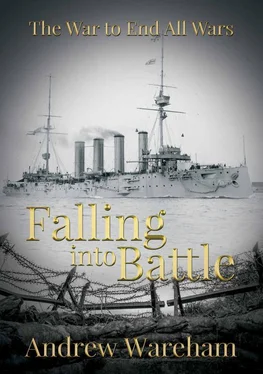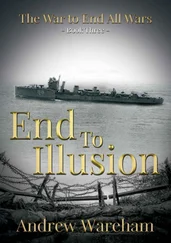There was a major stood on the steps of a medieval town hall, older than any building in Kettering other than the church.
Richard felt a little disturbed that the ancient town would almost certainly be destroyed in the next day or two of fighting. He was glad the war was not being fought on English soil – it didn’t matter quite so much that foreigners were to suffer.
Captain Platt marched across, introducing himself.
“Major Higgins-Hall, gentlemen. Are you a whole company?”
“Two officers and thirty-nine men, sir. We were eighty strong, two days ago. We were pushed west, holding a copse and then a bridge and colliery village while the remainder of the battalion – those that could – got away to the southeast. We are very low on ammunition, sir.”
The Fusilier picked up the implication of the sacrificed rearguard, was much impressed.
“I can help you there. The battalion’s wagon train is parked up behind the square here. My corporal will take you to them.”
“Much appreciated, sir. That should be our first priority. Baker, take the men to the wagons, please.”
Richard saluted and nodded to Sergeant Grace.
The fusiliers had a line of a dozen wagons tucked away out of sight behind the town hall. The corporal found a quartermaster-sergeant and Richard asked for his ammunition.
“Need a docket, sir. Can’t issue to a different battalion except under signature, sir. Major to sign, sir.”
Richard stared at the ignorant, self-satisfied, plump little man, could see there was no gain to arguing.
“Corporal, would you go back to your major? If possible, ask him to come here in person.”
The corporal ran, nervous, something in Richard’s tone telling him that he was on edge, close to precipitate action. Major Higgins-Hall appeared in less than five minutes.
“Problems, Lieutenant?”
“Your QM refuses to issue, sir.”
The little sergeant smirked.
“Can’t give battalion supplies out to any old Tom, Dick or Harry, sir! Fusilier’s stores are for Fusiliers only, sir.”
“We are fighting a war, Sergeant Dickson. If you have not made the issue within five minutes, I will see you broken to private and placed in the ranks of a rifle company – not that they will want you! Move, man!”
The quarter-master sergeant shouted at one of his corporals to disburse sixty rounds per man to the Bedfordshires.
“Beg pardon, sir. I made a double issue yesterday.” Richard smiled apologetically. “Most of them have fired off more than one hundred rounds in barely twenty-four hours. The Germans are coming shoulder to shoulder by the brigade, backed by machine guns.”
“One hundred and twenty rounds per man, Dickson. Then make ready for the same issue to our people. The first company will be here within fifteen minutes.”
Dickson answered unthinkingly, automatically uncooperative when it came to issuing supplies.
“Can’t permit that, sir. It’s not regulation, sir!”
“Private Dickson, strip those badges of rank from your tunic. Now! At the double to the front of the town hall and inform Sergeant Heckmondwyke in B Company that you have come to join his ranks. Take your rifle with you.”
“Haven’t got a rifle, sir. QM sergeants carry a side arm, sir.”
“Issue yourself a rifle, pouches, one hundred and twenty rounds and a cleaning kit. Report to me one hour from now and display a rifle stripped of factory grease and in perfect firing condition. Double, Private Dickson!”
The ex-sergeant ran and Major Higgins-Hall turned smiling to Richard.
“Bloody quartermasters! I have wanted an excuse to break that man since first I saw his scowling, pinch-mouthed face across a stores counter. Active service allows for initiative, I believe, particularly when we shall be in action very soon by the look of things. I see you are carrying a rifle, Lieutenant, but have no pouches.”
The major turned to the private soldiers who were hurriedly counting out ammunition.
“Pouches for this officer and a webbing belt to carry them!”
The flunkies ran.
“Late morning. Have you eaten?”
“Plate of stew at four o’clock, sir.”
“Braver man than me, to face army stew at that time of night. I’ll warn the cooks to knock up a meal for your men. We officers ate in the cafe across the square last night and this morning. I’ll send my runner across to them, get you an omelette or something like. Your captain is writing out a report to send back to Division, if we can locate it. No hope of discovering your Brigade from all I can gather.”
“Don’t know that we had one, sir. We reached Calais and were ordered to march and off we went, east, north, south then east again! The colonel might know who he reports to, but the news never reached me, sir.”
“Bloody shambles! At least our battalion knows who is where behind us. Brigade is trying to set up a line near Ypres and we are supposed to be slowing any advance upon them to give a week or more to dig in and establish communications. I’m in command of the battalion, by the way – colonel and senior major are both damned near sixty and collapsed sick on the first day’s march.”
Richard ate a luncheon and felt better for it. Eggs and chips followed by bread and cheese accompanied by strong coffee made him far more human. Captain Platt watched him scoff and shuddered – his belly was playing him up, full of acid and unwelcoming to the very thought of food.
“We are to hold the barricade to the west of the square, Baker. We wait here until we receive orders from Division – no sense wandering around half of Belgium trying to find the battalion. I have volunteered us to assist the Fusiliers while we remain.”
It had not occurred to Richard that they would not march south, but the decision was not his. He supposed that Platt was glad to have any senior officer to give him orders.
“Yes, sir. Split the men into two equal platoons, sir? Abbott and Ekins to have half each and work watches, Navy fashion?”
“Hadn’t thought – yes, that will work well.”
“I’ll give Sergeant Grace the order, sir. He will know which men to keep together and who it might be best to split up.”
“Make it so, Baker.”
“Yes, sir. Where can the men rest, sir?”
“They seem to be using the town hall, the Fusiliers, that is. Might be best to have our own billet, separate. Avoid any trouble. I’ll speak to the Major.”
Platt came back with permission to use any building convenient to the barricade.
“I’ll deal with it, sir.”
Richard marched across the square with Sergeant Grace. They glanced along the half a dozen shuttered storefronts, all with blinds down and iron grilles across the doors.
“Gentleman’s outfitters, sir – that will do. Likely be overcoats and such can be laid down for bedding. Keep the men comfortable. Corporal Abbott!”
Abbott produced two bronze pinchbars from his pack and ripped off the hinges of the grille across the front doors and then forced the door open.
“They come from the mine, don’t they, Abbott?”
“Yes, sir. Thought they might be handy. Never know when you might need to open a door, sir. Especial when you’re on the move, like, sir.”
“Where did you work, Abbott?”
“In the boot and shoe, sir. A laster, I was, what needs a bit of muscle to pull the leather onto the last. Did a bit of messing about on the building in me spare time and when the boot and shoe trade was slack.”
Richard thought he was very practised at breaking into buildings – but that really was no business of his.
The shop was large enough for twenty men to sleep on the floor and had racks of outdoor coats, as Sergeant Grace had predicted.
“Good English woollens, sir. Nice and warm and comfortable when you ain’t got a mattress. Corporal Ekins on the barricade first, sir. Corporal Abbott can have a bit of a look about, sir.”
Читать дальше












